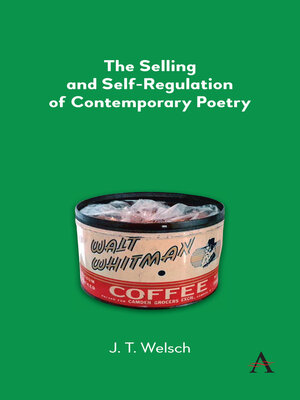
Sign up to save your library
With an OverDrive account, you can save your favorite libraries for at-a-glance information about availability. Find out more about OverDrive accounts.
Find this title in Libby, the library reading app by OverDrive.



Search for a digital library with this title
Title found at these libraries:
| Library Name | Distance |
|---|---|
| Loading... |
The Selling and Self-Regulation of Contemporary Poetry is the first book-length study of the contemporary poetry industry. By documenting radical changes over the past decade in the way poems are published, sold, and consumed, it connects the seemingly small world of poetry with the other, wider creative industries. In reassessing an art form that has been traditionally seen as free from or even resistant to material concerns, the book confronts the real pressures – and real opportunities – faced by poets and publishers in the wake of economic and cultural shifts since 2008. The changing role of anthologies, prizes, and publishers are considered alongside new technologies, new arts policy, and re-conceptions of poetic labour. Ultimately, it argues that poetry's continued growth and diversification also leaves individuals with more responsibility than ever for sustaining its communities.
|The Selling and Self-Regulation of Contemporary Poetry is the first book-length study of the contemporary poetry industry. By documenting radical changes over the past decade in the way poems are published, sold, and consumed, it connects the seemingly small world of poetry with the other, wider creative industries. In reassessing an art form that has been traditionally seen as free from or even resistant to material concerns, the book confronts the real pressures – and real opportunities – faced by poets and publishers in the wake of economic and cultural shifts since 2008. The changing role of anthologies, prizes, and publishers are considered alongside new technologies, new arts policy, and re-conceptions of poetic labour.
The historical frame helps to understand the legacy of increased funding in the UK in the previous decade, which Tony Blair described as a 'golden age' for the arts two months before his resignation, and a year before the global financial crisis which succeeding governments used to justify major funding cuts. With this economic emphasis, the book challenges the historical perception of poetry's market autonomy, for a period in which it has moved beyond Pierre Bourdieu's view of it as 'the disinterested activity par excellence'. Drawing on an emerging body of research into the newly defined creative economy, alongside materialist and sociological approaches, the book is structured around a range of case studies – from new publishing formats, new degree programmes and mentorship schemes, plagiarism scandals, to poems going 'viral' – emphasizing an underlying shift towards professionalisation and entrepreneurial rhetoric associated with new poetry. Ultimately, it argues that poetry's continued growth and diversification also leaves individuals with more responsibility than ever for sustaining its communities.







